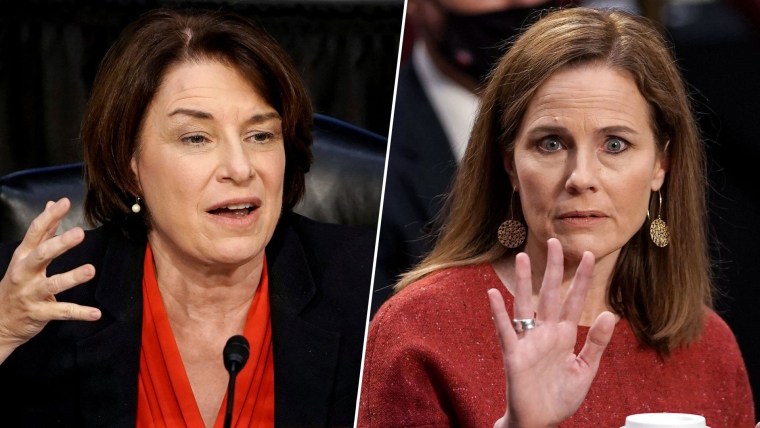WASHINGTON — With the help of senators of both parties, Supreme Court nominee Amy Coney Barrett laid out a road map for overturning the Roe v. Wade ruling protecting abortion rights and the Brown v. Board of Education decision outlawing school segregation.
Barrett declined to say Tuesday how she would rule on any future cases, including those involving abortion, racial discrimination, voting rights and the Affordable Care Act.
But she did articulate clear views about the relative susceptibility of Roe and Brown to being reversed. She said Brown is settled only so long as no one sues the government — federal, state or local — for segregating schools. And she said Roe, because it is the subject of more controversy, is more open to being thrown out.
Download the NBC News app for breaking news and politics
Brown, Barrett said under questioning from Senate Judiciary Committee Chairman Lindsey Graham, R-S.C., is among a handful of cases considered “super precedents” in the legal community because “it is unthinkable it would be overturned.”
While Barrett noted that “super precedent” is a term of art rather than a doctrine that binds the Supreme Court, she said reversing Brown would require that “Congress or some state or local government impose segregation again.”
That apparently wasn’t the sound bite Graham wanted to hear. He quickly interjected.
“Let us stop there,” he said. “If you want to make yourself famous, you can say we want to go back to segregation,” Graham said. “The point you’re making is the court just cannot wake up and say, ‘Let us revisit Brown.’ … Before a decision could be made, somebody would have to be dumb enough to pass a law saying, ‘Let us go back to segregated schools.’ Is that fair to say?”
“That’s fair to say,” Barrett replied to the helpful cue from Graham.
Neither Barrett nor Graham mentioned that the bar for a challenge is not whether the government has imposed segregation but whether a litigant claims that it has. It would then be up to the court to decide whether a law or a policy violated the equal protection clause of the 14th Amendment, which is the underpinning of Brown.
Therefore, Brown, which more than two dozen Trump nominees to the federal bench have declined to say was rightly decided, is at risk only if someone sues. The effect of the exchange between Graham and Barrett may well be to put a chilling effect on potential suits against laws perceived to implement segregation.
It serves as a warning to progressive groups that any challenge to perceived discrimination makes Brown vulnerable in a way that it is not now. Because the federal judiciary is stocked with new Trump appointees who have refused to affirm Brown, it is not inconceivable that a lower court would reject a claim of unconstitutional discrimination in schools, knowing the question would be appealed to the high court.
Consequently, Barrett and Graham may also have created space for state or local governments to implement more discriminatory school policies without the fear of being challenged by litigants who are concerned about the prospects of Brown’s being overturned.
Barrett’s exchange with Sen. Amy Klobuchar, D-Minn., revealed more about her thinking on the two rulings.
Barrett said Brown “is precedent.” In a previously written article, she said that “it is super precedent” and that because “people consider it to be on that very small list of things that are so agreed upon by everyone, calls for its overruling do not exist.”
Supreme Court justices sometimes reverse the rulings of their predecessors when there is no public outcry on one side or the other. That is why so few case names are as familiar to the public as Brown v. Board of Education and Roe v. Wade.
“I’ve been answering a lot of questions about Roe, which I think indicates Roe does not fall in [the super precedent] category,” Barrett said. “Scholars across the spectrum say that it does not mean that Roe should be overruled … and as Richard Fallon from Harvard said, Roe is not a super precedent, but that does not mean it should be overruled.”
That is, the Roe ruling is weaker than the Brown ruling specifically because there are calls for its reversal. And yet the modern confirmation process is a reflection of the changing priorities of the public and of its representatives in government at the federal, state and local levels.
The grilling of nominees dates to the wake of the Brown ruling, when segregationists began dominating hearings with questions about whether nominees agreed with the decision and others by the court under the leadership of Chief Justice Earl Warren. Southern-bloc senators accused the court of legislating from the bench, a term that has survived in the lexicon of Senate confirmations.
A third senator, Sheldon Whitehouse, D-R.I, used an unusual carousel of charts to make a point about the way interest groups seek to influence the composition of the court and its decisions — by culling lists of potential picks for Republican presidents and spending untold millions of dollars on promoting those nominees and cases that would challenge existing law.
It is “all of the same funders over and over again, bringing the cases and providing this orchestrated chorus,” Whitehouse said during a soliloquy in which he declined to ask any questions of Barrett.
Some of the same strategies used by the political right today mirror those of civil rights lawyers more than half a century ago, and modern progressive interest groups are well-funded and active both in advising Democratic presidents and trying to influence which cases get to the high court.
To Barrett’s point about Brown, it is such litigation that gives the court the power to interpret the Constitution and its application to federal, state and local laws. What the senators revealed for the public over the course of the day is how Roe and Brown could be overturned — according to Barrett.












